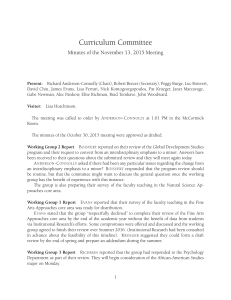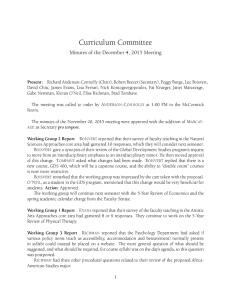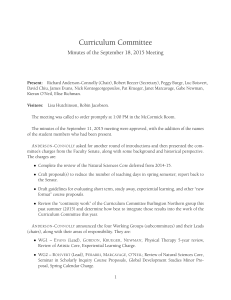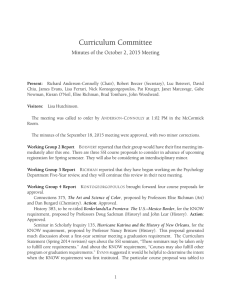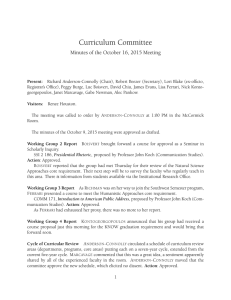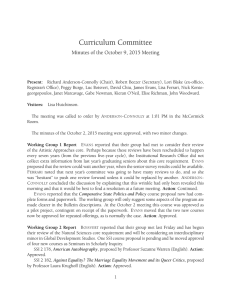Curriculum Committee Minutes of the October 30, 2015 Meeting
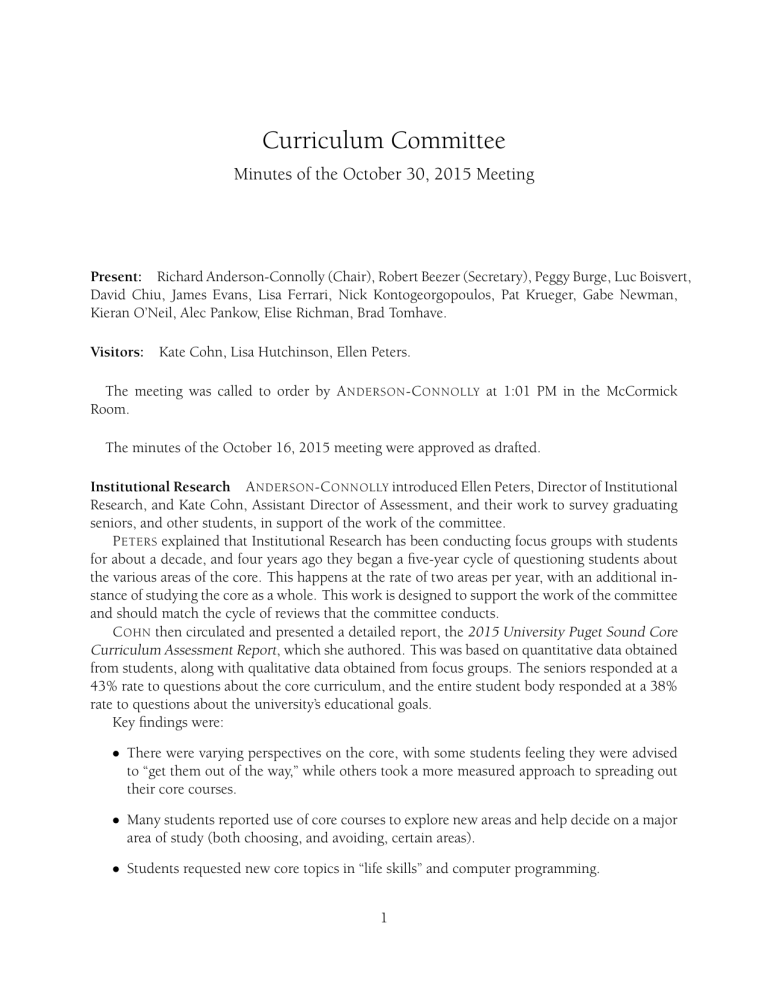
Curriculum Committee
Minutes of the October 30, 2015 Meeting
Present: Richard Anderson-Connolly (Chair), Robert Beezer (Secretary), Peggy Burge, Luc Boisvert,
David Chiu, James Evans, Lisa Ferrari, Nick Kontogeorgopoulos, Pat Krueger, Gabe Newman,
Kieran O’Neil, Alec Pankow, Elise Richman, Brad Tomhave.
Visitors: Kate Cohn, Lisa Hutchinson, Ellen Peters.
The meeting was called to order by A NDERSON -C ONNOLLY at 1:01 PM in the McCormick
Room.
The minutes of the October 16, 2015 meeting were approved as drafted.
Institutional Research A NDERSON -C ONNOLLY introduced Ellen Peters, Director of Institutional
Research, and Kate Cohn, Assistant Director of Assessment, and their work to survey graduating seniors, and other students, in support of the work of the committee.
P ETERS explained that Institutional Research has been conducting focus groups with students for about a decade, and four years ago they began a five-year cycle of questioning students about the various areas of the core. This happens at the rate of two areas per year, with an additional instance of studying the core as a whole. This work is designed to support the work of the committee and should match the cycle of reviews that the committee conducts.
C OHN then circulated and presented a detailed report, the 2015 University Puget Sound Core
Curriculum Assessment Report , which she authored. This was based on quantitative data obtained from students, along with qualitative data obtained from focus groups. The seniors responded at a
43% rate to questions about the core curriculum, and the entire student body responded at a 38% rate to questions about the university’s educational goals.
Key findings were:
• There were varying perspectives on the core, with some students feeling they were advised to “get them out of the way,” while others took a more measured approach to spreading out their core courses.
• Many students reported use of core courses to explore new areas and help decide on a major area of study (both choosing, and avoiding, certain areas).
• Students requested new core topics in “life skills” and computer programming.
1
• Students requested more of a global emphasis, and also felt the KNOW requirement was a positive addition.
• A vast majority of seniors felt the core had greatly impacted their educational experience.
• Questions of all students on educational goals mostly demonstrated statistically significant impact from their educational experience, with one exception. It appears students felt no significant effect on their “acknowledged set of personal values.”
K ONTOGEORGOPOULOS asked about the “drop-off” in responses to three of the educational goals moving from juniors to seniors (page 6). P ETERS and C OHN explained that the student responses are being collected for the first time on a continuum rather than in discrete categories. So the comparisons between last year’s juniors and seniors involve two different groups of individuals.
As the survey is repeated in subsequent years, it will be possible to compare the same group of students over time. Additionally, students are grouped according to units completed. P ETERS said an effort will be made to determine the real class a student belongs to.
A NDERSON -C ONNOLLY wondered how we might better engineer the questions posed to students in light of the desires of committee members conducting reviews. Of course, the relevant working group does not exist when the students are being surveyed the previous spring. After some discussion between B OISVERT , A NDERSON -C ONNOLLY , and P ETERS , it was decided that Institutional Research would continue to invite faculty teaching in the relevant core area to suggest important areas for questions in advance of the survey, while committee members would suggest improvements to the questions in their year-end report after conducting their review. This will require making this task clear in our guidelines, and for Institutional Research to save the suggestions for the next iteration (which they are organized for already). Additionally, A NDERSON -C ONNOLLY and F ERRARI will see to it that the new seven-year cycle of reviews is communicated to Institutional
Research.
P ETERS and C OHN were thanked for their appearance with a round of applause as they left.
Working Group 1 Report E VANS reported that their review of the Physical Therapy program continues and they will consult A NDERSON -C ONNOLLY and F ERRARI with questions on some details.
K RUEGER asked if their review of the Artistic Approaches core area would continue in the absence of survey data, and A NDERSON -C ONNOLLY affirmed that the review should continue.
Working Group 2 Report B OISVERT reported that their review of the Natural Science Approaches core requirement continues, and they are close to surveying the appropriate faculty. They will meet today to begin discussing the Global Development Studies minor. Outstanding tasks include the Spring Calendar and their review of the Economics Department.
Working Group 3 Report R ICHMAN will very soon communicate questions to the Psychology
Department as part of their review. They have not yet begun consideration of the African-American
Studies major.
2
Working Group 4 Report K ONTOGEORGOPOULOS brought forward three courses for approval for the KNOW graduation requirement.
Politics and Government 104, International Political Theory . It was uncertain if this proposal was for every section of PG 104, or a particular instance taught by one faculty member. K ONTO -
GEORGOPOULOS will investigate.
Action : Tabled.
Philosophy 389, Race and Philosophy , proposed by Professor Sam Liao (Philosophy).
Action :
Approved.
Politics and Government 346, Race in the American Political Imagination , proposed by Professor Alisa Kessel (Politics and Government).
Action : Approved.
K ONTOGEORGOPOULOS then proposed approval of the Five-Year Curriculum Review of the
Physical Education Department. Even though many of the questions are not relevant for this unique department, the group was impressed by the care taken with the review and the department’s assessment efforts. The committee was informed that yoga continues to be popular, as is the strength and conditioning course, while dance classes have faded in popularity.
Construction of the new aquatic center, and related new facilities, have disrupted the available facilities this year and the department expects to adjust its offerings accordingly when the new facilities open. No questions were sent back to the department, so A NDERSON -C ONNOLLY encouraged the group to formulate a short paragraph about the review for their year-end report.
Action : Review Accepted.
The group has now received the review of the Science, Technology and Society Program.
Working Group Scheduling Priorities A NDERSON -C ONNOLLY suggested that the review of the Psychology Department should be a priority since it was received early. Other curriculum reviews should also be a priority of working groups. Then program changes, such as the Global
Development Studies minor and the African-American Studies major, should come next.
SSI + KNOW In news of the matter of a KNOW overlay on a Seminar in Scholarly Inquiry,
A NDERSON -C ONNOLLY reported that the Faculty Senate had sent it to the Curriculum Coordination Committee. A NDERSON -C ONNOLLY speculated we might just never see it again. There was genuine concern expressed for the course which had prompted the question.
Old Business Old business will remain old business as the hour was nigh.
At the next meeting, B OISVERT will report on proposed changes to the committee’s forms, especially since he will be unavailable while on sabbatical in the Spring.
The motion to adjourn was made by R ICHMAN , professor of Art, at 1:57 PM. The next meeting of the full committee will be November 13.
Respectfully submitted,
Robert Beezer
3
